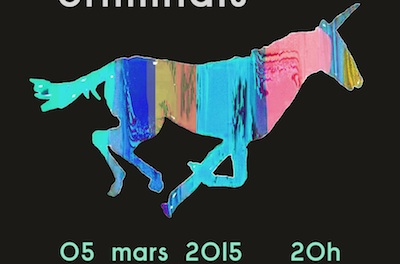TO DO Tonight: Dear Criminals and Frannie Holder’s European Alter-Ego
Easiest pun in the world, but it’s a bit of a crime that Dear Criminals aren’t as well known in their hometown, Montreal, than they are in western Europe. I’d call it minimalist electro-folk music but the genre doesn’t do justice to what is actually heard: Frannie Holder’s ethereal voice, coupled with that of Charles Lavoie’s firmer one, perked up by Vincent Legault’s textural instrumentation. Just back from a month or so of shows in Italy and France, I managed to have a quick chat with Frannie Holder about future plans, handling multiple personas, and using her voice as an instrument.
Joel Mak (JM): So what’s Dear Criminals (DC) up to at the moment?
Frannie Holder (FH): There’s a show on Thursday, which is our main goal at the moment. We don’t play often in Montreal and the times we have played there, it’s always been for a specific project that’s either mixed with theatre or dance. This is one of the first times that we’re going to just play our music so that’s exciting and nerve-wrecking for us. Then at the end of the month, we’re heading back to France for a week where we can write and mix an EP in the studio there.
JM: It looks like DC likes to work in France and Italy.
FH: Yeah, we’ve played more often there than anywhere else. There’s a bigger response in Europe than in Quebec. We’ve just created more affinity with the crowds there and we have more resources there available to us. This time there’s also a practical reason because the boys were going to be touring Europe with a dance crew, so it’s cheaper to bring me there for the recording.
JM: What sort of fan base do you have for DC? Is there a carry over from your other band Random Recipe (RR)?
FH: Actually, no, and that’s quite surprising. I normally recognise half the faces in the crowd at a Montreal indie show but at our DC shows we don’t seem to recognise anyone! It’s kinda weird. We’ve been featured on Radio-Canada and people who follow Radio-Canada can be in their 40s which is a completely different crowd to RR. Another thing though is that we’ve never used RR as a springboard for DC. We really wanted two different things. I didn’t want to repeat the same thing with a different band.
JM: I’ve read somewhere that you feel as though DC is a less restrained space and there’s more freedom.
FH: It was at the start of the project. You don’t know where things are going so there are no limits or barriers. It’s like a honeymoon or a new romance. Now I’m just really interested in the type of things that I get to write. DC is more introspective — it demands another psychological aspect of myself. RR is a complete other process which is a patchwork of other genres. It’s very fulfilling to work in two different ways and see different types of magic happen in both bands.
JM: So there’s a different persona involved for DC.
FH: Yeah. In RR you’re running around on stage but in DC you’re very still. And I guess if I have a third project there would be a different persona too.
JM: What’s the third EP going to be like?
FH: We pretty much have all the tracks written but they’re not finalised and we don’t have a global feel yet. I think we’re going back to really minimalistic arrangements: guitar and vocals. We’ve just worked and focused on having strong, depressing melodies, but we don’t know what it’ll sound like when we get to the studio.
JM: With minimalist music your voice is really at center stage. You have some unique vocals and ways of enunciation. When did you start singing and was there a particular learning process?
FH: I was in a choir as a kid, though I wasn’t in the lead. I play a bunch of instruments but my main instrument is my voice so I like to test the range and experiment with textures. I want emotion to come through the pronunciation of what I’m singing rather than the meaning of the words. I like to end words with a weird kind of vibrato even if people end up not understanding the words—I really don’t care! The emotion is there.
In RR I take the spotlight as the vocalist but the great thing about DC is that I get to work on vocal harmonies with Charles, or juxtapose my softer vocals with his stronger features. It’s the funnest thing about this project for me.
I also like the evolution of voices. Over time, a pianist loses dexterity, but the piano sounds the same way, you know? With a voice, things change—I can’t sing what I wrote eight years ago. One of the main jobs of a singer is to watch your own voice but I don’t care about that either. Some singers don’t party before a show, but I don’t really have restrictions and I just deal with the voice I have. Billie Holliday didn’t try to go back to the voice she had when she was younger—she adapted a new repertoire for her aging voice. I think that’s beautiful so hopefully I get to do that with time.
Dear Criminals play at Le National (1220 St. Catherine East) on March 5. 7 p.m.






